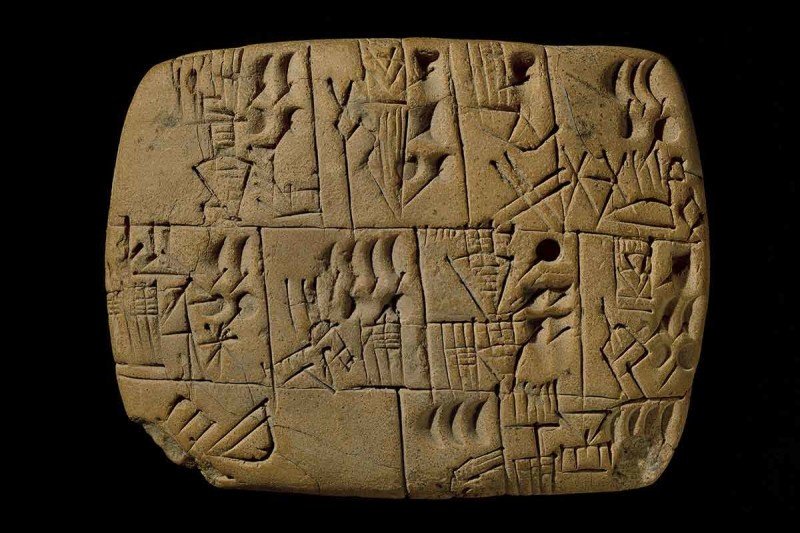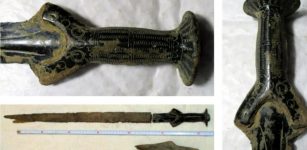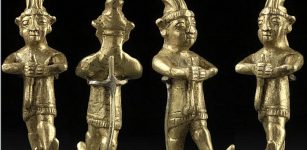World’s Oldest Paycheck Reveals Ancient Sumerian Workers Were Paid In Beer
A. Sutherland - AncientPages.com - A roughly 5,000-year-old cuneiform stone tablet, in possession of the British Museum in London shows how workers were paid their daily rations in liquid gold.
We have previously seen that the oldest evidence of beer was found on a Sumerian tablet in Mesopotamia.
The drink was apparently so popular that ancient Sumerian workers were paid for their labor in beer and this practice was widely known in ancient world.

A 5,000-year-old cuneiform tablet from the ancient Mesopotamian city of Uruk depicts the distribution of beer to workers as part of their daily rations.
The tablet made around 3100 to 3000 BC. , excavated from Uruk , an ancient city of Sumer and later Babylonia, situated east of the present bed of the Euphrates river, depicts a human head eating from a bowl, meaning ‘ration,' and a conical vessel, meaning ‘beer. There are undoubtedly several reasons why beer was so popular in Mesopotamia. The drink was was safer and tasted better than water.
The Sumerian workers were not the only one who received payment in form of beer. Beer was also of central importance to ancient Egyptian society. Beer was the staple drink of ancient Egyptian workers and craftsmen while wine was for rich people.
See also:
Walls Of Uruk Built By Sumerian King Gilgamesh 4,500 Years Ago
Oldest Evidence Of Beer Was Found On A Sumerian Tablet In Mesopotamia
In ancient Egypt, workers often received wages were often paid in beer and other supplies and the workmen living in the workers village at Giza received beer three times a day as part of their rations. A daily ration could be as much as four to five liters beer.
There are also records of poet and the “Father of English literature” Geoffrey Chaucher receiving a yearly salary of 252 gallons of wine from Richard II.
Receiving wages in form of alcohol has happened on several occasions throughout history, and the trend is still practiced by some modern companies.
Ancient Egyptians also valued beer and used it not only to get drunk, but as medicine and payment. Beer was of great importance in the ancient Egyptian society and its existence gave women an opportunity to earn extra money.
Wages were often paid in beer and workers living in the workers village at Giza received beer three times a day as part of their rations. Archaeologists excavating in Egypt have discovered that payment through beer was very common in various parts of the country.
Written by – A. Sutherland - AncientPages.com Senior Staff Writer
Copyright © AncientPages.com All rights reserved. This material may not be published, broadcast, rewritten or redistributed in whole or part without the express written permission of AncientPages.com
More From Ancient Pages
-
 British Museum Is World’s Largest Receiver Of Stolen Goods – Says QC
Archaeology | Nov 12, 2019
British Museum Is World’s Largest Receiver Of Stolen Goods – Says QC
Archaeology | Nov 12, 2019 -
 Takshashila: Renowned Learning Center That Attracted Buddhist Masters, Disciples And Students Of The World
Featured Stories | Jul 23, 2016
Takshashila: Renowned Learning Center That Attracted Buddhist Masters, Disciples And Students Of The World
Featured Stories | Jul 23, 2016 -
 Mysterious Ancient Hittite Tablets And 8,000-Year-Old Ornaments Discovered In Kateřinská Cave, Czech Republic
Archaeology | Dec 18, 2025
Mysterious Ancient Hittite Tablets And 8,000-Year-Old Ornaments Discovered In Kateřinská Cave, Czech Republic
Archaeology | Dec 18, 2025 -
 Syamantaka – Divine Jewel With Magical Powers Was A Gift From The Sun God In Hindu Mythology
Featured Stories | Mar 1, 2019
Syamantaka – Divine Jewel With Magical Powers Was A Gift From The Sun God In Hindu Mythology
Featured Stories | Mar 1, 2019 -
 Gigantic Asipatra: Terrifying Mythical Monster Bird In Hindu Beliefs
Featured Stories | Jun 14, 2017
Gigantic Asipatra: Terrifying Mythical Monster Bird In Hindu Beliefs
Featured Stories | Jun 14, 2017 -
 Impressive Marble Statue Of A Ram, An Ancient Christian Symbol For Jesus Discovered
Ancient Symbols | Dec 28, 2015
Impressive Marble Statue Of A Ram, An Ancient Christian Symbol For Jesus Discovered
Ancient Symbols | Dec 28, 2015 -
 Strange Ancient Artifacts And Foreigners Who Were Not Meant To Be In North America
Ancient Mysteries | Mar 16, 2020
Strange Ancient Artifacts And Foreigners Who Were Not Meant To Be In North America
Ancient Mysteries | Mar 16, 2020 -
 Vast Paleogenetic Study Reveals Insights On Migration, Farming And Language Development Across The Southern Arc
Archaeology | Aug 26, 2022
Vast Paleogenetic Study Reveals Insights On Migration, Farming And Language Development Across The Southern Arc
Archaeology | Aug 26, 2022 -
 3,000-Year-Old Nimrud Lens Could Re-Write The History Of Science – Was The World’s Oldest Telescope Developed By Ancient Assyrian Astronomers?
Ancient Technology | Oct 19, 2014
3,000-Year-Old Nimrud Lens Could Re-Write The History Of Science – Was The World’s Oldest Telescope Developed By Ancient Assyrian Astronomers?
Ancient Technology | Oct 19, 2014 -
 DNA Shows First Scandinavians Followed Two Distinct Migration Routes
Archaeology | Jan 11, 2018
DNA Shows First Scandinavians Followed Two Distinct Migration Routes
Archaeology | Jan 11, 2018 -
 Meet The First Neanderthal Family And Community
Archaeology | Oct 19, 2022
Meet The First Neanderthal Family And Community
Archaeology | Oct 19, 2022 -
 Strange History Of Safety Coffins: From Ancient To Modern Times
Featured Stories | Feb 9, 2016
Strange History Of Safety Coffins: From Ancient To Modern Times
Featured Stories | Feb 9, 2016 -
 Rare 3,300-Year-Old Sword Accidentally Discovered In Jesenicko, Czech Republic
Archaeology | Nov 9, 2020
Rare 3,300-Year-Old Sword Accidentally Discovered In Jesenicko, Czech Republic
Archaeology | Nov 9, 2020 -
 Unexplained Historical Sighting And Archaeological Discovery Reported In Alberta By Police Officer
Featured Stories | Jul 1, 2024
Unexplained Historical Sighting And Archaeological Discovery Reported In Alberta By Police Officer
Featured Stories | Jul 1, 2024 -
 Ancient DNA’s Analysis Delivers Crucial Clues To Migratory Patterns During The First Millennium AD
DNA | Jan 2, 2025
Ancient DNA’s Analysis Delivers Crucial Clues To Migratory Patterns During The First Millennium AD
DNA | Jan 2, 2025 -
 Mystery Of The 1,700-Year-Old ‘Salt’ Mummy With Long White Hair
Featured Stories | Sep 14, 2016
Mystery Of The 1,700-Year-Old ‘Salt’ Mummy With Long White Hair
Featured Stories | Sep 14, 2016 -
 Golden Figurine From Yozgat Depicts Unknown Hittite God
Artifacts | May 11, 2016
Golden Figurine From Yozgat Depicts Unknown Hittite God
Artifacts | May 11, 2016 -
 Political Debates In Ancient Rome: Great Harshness, Personal Attacks And Unpleasant Atmosphere
Archaeology | Aug 29, 2018
Political Debates In Ancient Rome: Great Harshness, Personal Attacks And Unpleasant Atmosphere
Archaeology | Aug 29, 2018 -
 Exceptionally Long-Lived Ancient Form Of Hydraulic Engineering Unearthed In The Nile Valley
Archaeology | Jun 13, 2023
Exceptionally Long-Lived Ancient Form Of Hydraulic Engineering Unearthed In The Nile Valley
Archaeology | Jun 13, 2023 -
 Rare 2,300-Year-Old Tomb Of Greek Courtesan Found In Jerusalem Burial Cave
Archaeology | Sep 28, 2023
Rare 2,300-Year-Old Tomb Of Greek Courtesan Found In Jerusalem Burial Cave
Archaeology | Sep 28, 2023
